Buyers Switch to Fleet Management Software for Greater Efficiency, Functionality, and New Business Opportunities
From vehicle tracking to maintenance scheduling, fleet managers often have to deal with the complexities of optimizing routes, maintaining vehicle health, and managing fuel costs. With a fleet management solution, these professionals can streamline vehicle management by obtaining real-time insights into vehicle locations, maintenance needs, and driver behavior.
To make the right software purchase, knowing the correct set of features, average software price, and common challenges faced while purchasing fleet management software is crucial.
Each year, Software Advice's advisors speak with thousands of software buyers evaluating new fleet management software for their businesses. We've mined those conversations to provide insights that will help small businesses understand the budget requirements, feature needs, and pain points of current users to finalize the best tool for their needs.
Key insights
Software buyers from the fleet management industry prioritize dispatch and scheduling functionality during purchase, while actual users consider global positioning system (GPS) as the top priority in fleet management software.
Most businesses either rely on third-party software or use manual methods for their day-to-day fleet management practices.
Switching to fleet management software is driven by the need for efficiency, functional sufficiency, and new business opportunities.
The top five industries investing in fleet management software allocate between $67-$158 per user per month, with an overall buyer average of $124 per user per month.
Buyers seek dispatch and scheduling, while users rate GPS as a critical feature
Based on our data from conversations with software buyers and active users, twenty-nine percent of actual users rate GPS as a critical feature. Compared to that, 69% of fleet management software buyers seek dispatch and scheduling functionality during software purchase.
To gain insights into user preferences, we analyzed thousands of fleet management software reviews available on Software Advice to identify the features that the users of the software consider most critical for their daily work. Interestingly, our findings revealed a discrepancy between the priorities of fleet management software buyers and users.
While dispatch and scheduling emerged as the most-requested feature from buyers during the software selection process, GPS ranked as the most critical feature according to actual users.
These findings indicate that businesses already using fleet management software find immense value in GPS functionality. The feature enables fleet managers to view the exact location of each vehicle on a map in real time, ensuring efficient vehicle monitoring and delivery. GPS capabilities in fleet management software also facilitate route optimization and navigation, which helps fleet managers save time, fuel, and money.

Pro tip
Prioritize your fleet and operational considerations before investing in a fleet management tool. Consider your fleet size, geographic coverage, and industry-specific requirements, such as hours-of-service (HOS) compliance, to select the best fleet management software for your needs.
Most businesses use third-party software or manual methods for their day-to-day fleet management practices
When our advisors asked buyers what methods they were currently using to handle their day-to-day fleet management operations, here's what they found:
Twenty-nine percent of buyers use third-party software such as accounting and enterprise resource planning (ERP) systems to automate financial workflows. However, the tools often lack capabilities for their service division.
Thirty percent of buyers use manual methods such as spreadsheets to track vehicle information or physical calendars for scheduling purposes.
Compared to such methods, a dedicated fleet management software solution offers better functionality. It automates several tasks such as route planning and optimization, scheduling, and vehicle tracking, reducing the need for paperwork and manual intervention. Fleet management software often includes collaboration tools, such as instant messaging, group chats, push notifications, and document sharing to help team members communicate and share information more efficiently.
Another benefit of dedicated fleet management software is that it eliminates the need for multiple third-party solutions to manage your vehicle operations.
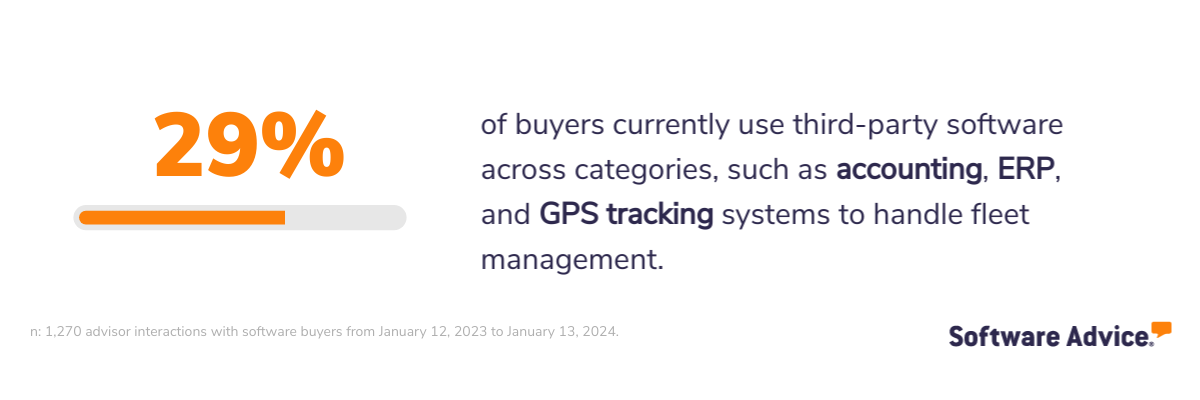
Pro tip
Consider a fleet management solution that integrates with your existing systems, such as accounting, logistics, fuel management, maintenance management, and safety management systems to ensure seamless data flow and streamlined operations.
Inefficiency, limited functionality, and new business opportunities are key drivers of a switch to fleet management software
Our advisors conversed with buyers currently using either manual methods or third-party software and seeking a switch to fleet management software. These discussions shed light on businesses' real-life challenges with their existing tools. These included inefficiency (44%), limited functionality (30%), and new business opportunities (9%).
Inefficiency: Planning routes, scheduling, and tracking vehicles manually are time-consuming and prone to errors. Additionally, manual methods can make it challenging for fleet managers to identify trends in fuel consumption and driver behavior, causing delays in making informed decisions.
Limited functionality: Manual methods like spreadsheets can only help professionals in basic route planning without taking into consideration real-time traffic conditions, fuel costs, and driver breaks. On the contrary, fleet management software enables real-time vehicle tracking, giving fleet managers a transparent view of every vehicle, their availability status, and fuel levels.
New business opportunities: Several transportation businesses look to switch to new software to attract bigger contracts and expand their business footprint. Fleet management software facilitates efficient route planning and real-time tracking, enabling businesses to handle larger deliveries with wider geographical areas. It also helps businesses adjust to changing customer demands and market trends, keeping them ahead of the curve.
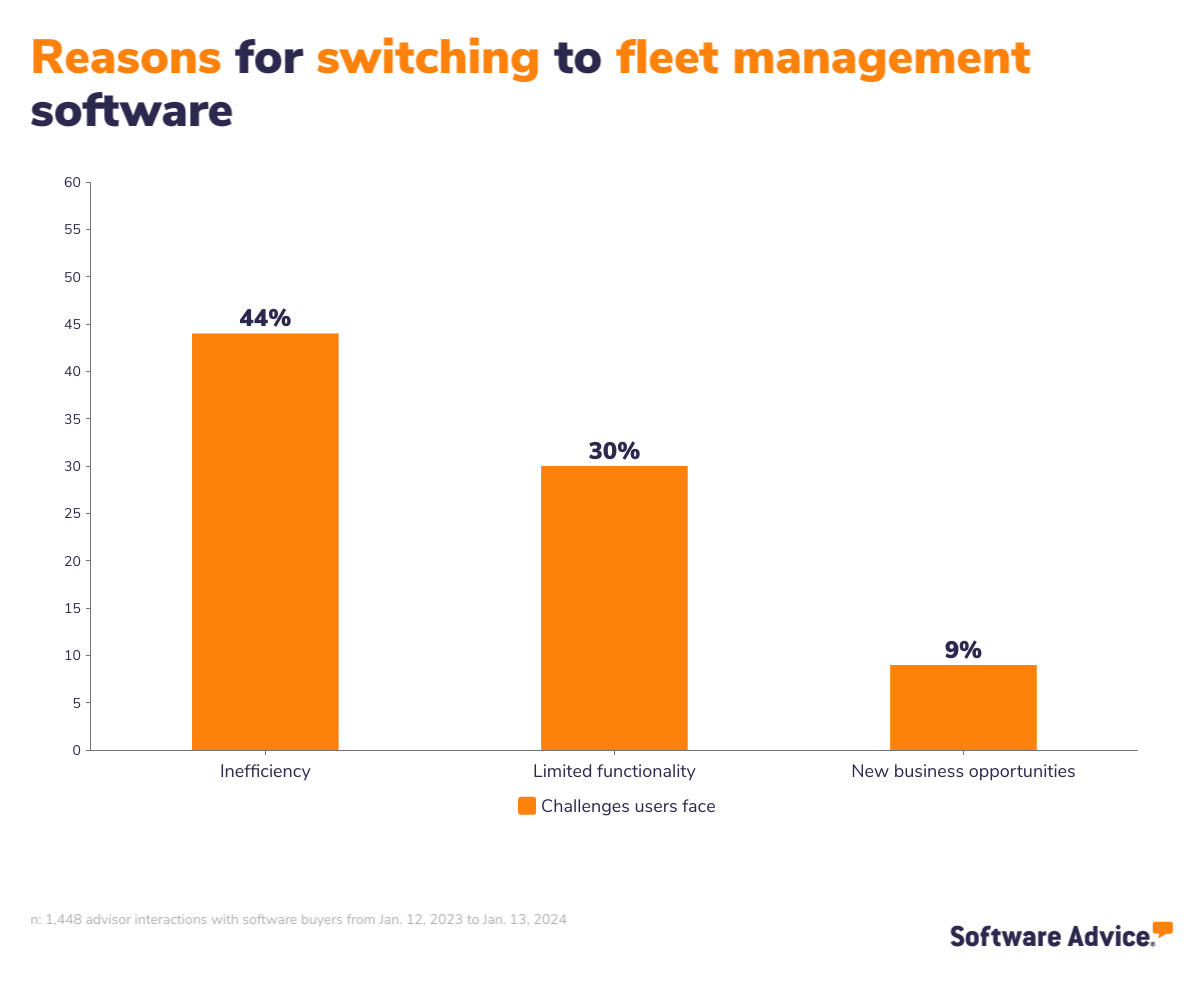
Pro tip
Shortlist a fleet management solution that can grow with your business and accommodate increased vehicles, drivers, and operations over time. Additionally, ensure that the tool offers flexible pricing plans that adapt to your growing fleet size.
The average buyer’s budget ranges from $67 to $158 per user, per month
The budget for purchasing fleet management software varies from industry to industry based on factors such as fleet size, the number of users, and the required functionality.
However, the average budget across industries for purchasing fleet management software was approximately $124 per user per month.
The chart below highlights the average buyer budget per user, per month for the top five industries interested in fleet management software.
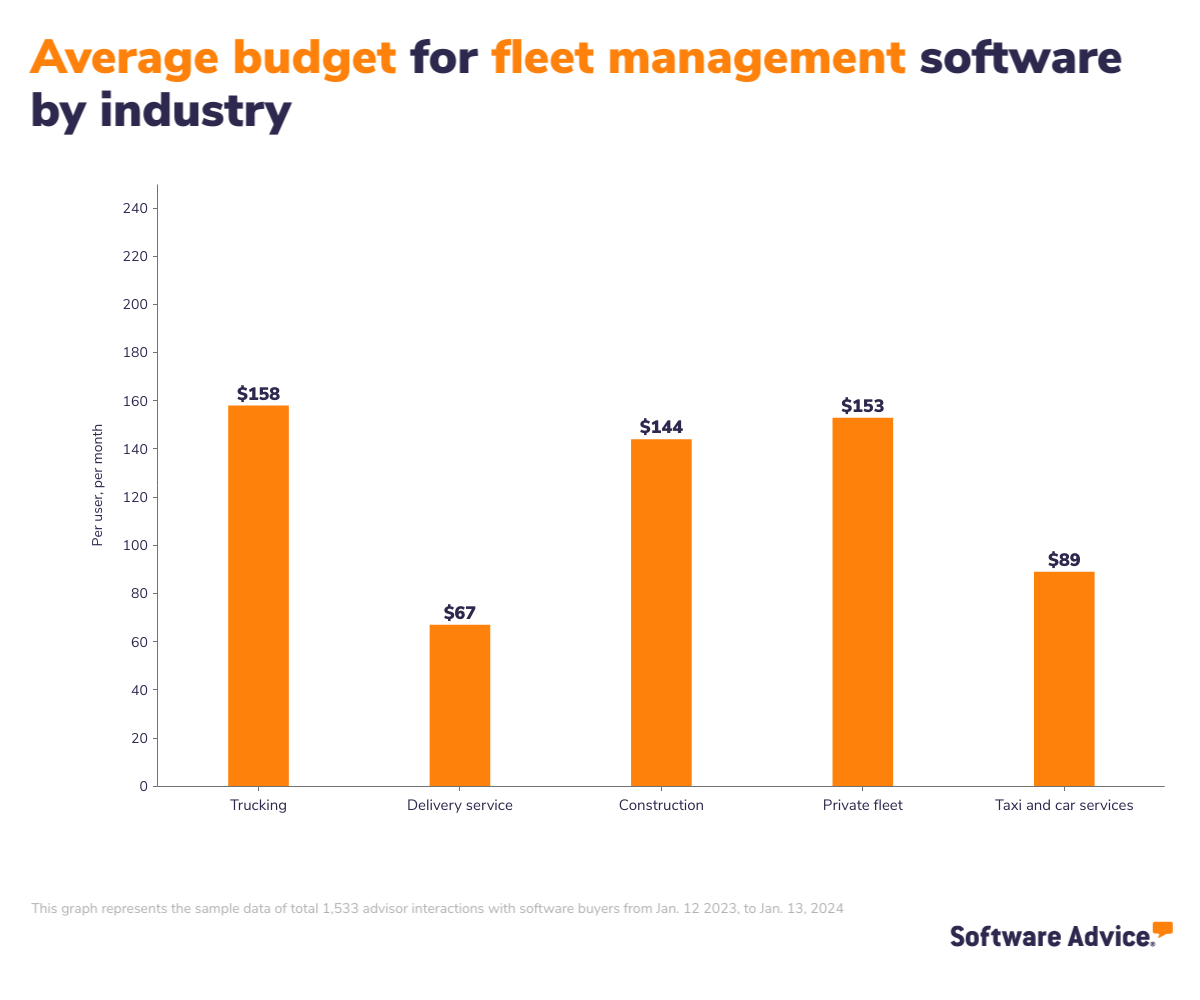
The average budget for each industry slightly differs from the overall average due to industry-specific requirements.
Delivery services need fleet management solutions for efficient navigation within cities and densely populated areas. They usually have basic feature requirements, such as real-time updates, route planning, and two-way communication.
Trucking businesses, on the other hand, focus on optimizing long-distance routes across states and territories while catering to strict regulations and demanding deadlines. Therefore, they often need advanced route optimization for multi-modal logistics, predictive maintenance, GPS-based tracking, and advanced reporting features in fleet management software.
More resources for your software search
Whether you’re looking to buy new fleet management software or replace your existing tool, here are some additional resources to aid your software search:
Start with our interactive fleet management software directory to compare hundreds of products, filter your search by specific features, and read comprehensive reviews from SMB leaders.
Check out top-rated fleet management software based on user ratings and popularity in the 2023 Fleet Management Frontrunners Report.
Review the fleet management software buyers guide to better understand the fleet management software market.
Buyer demographics
The buyers we interacted with are largely small businesses. You’ll find the demographics of the buyers below, so you can see the sizes and types of businesses, from annual revenue to industry.
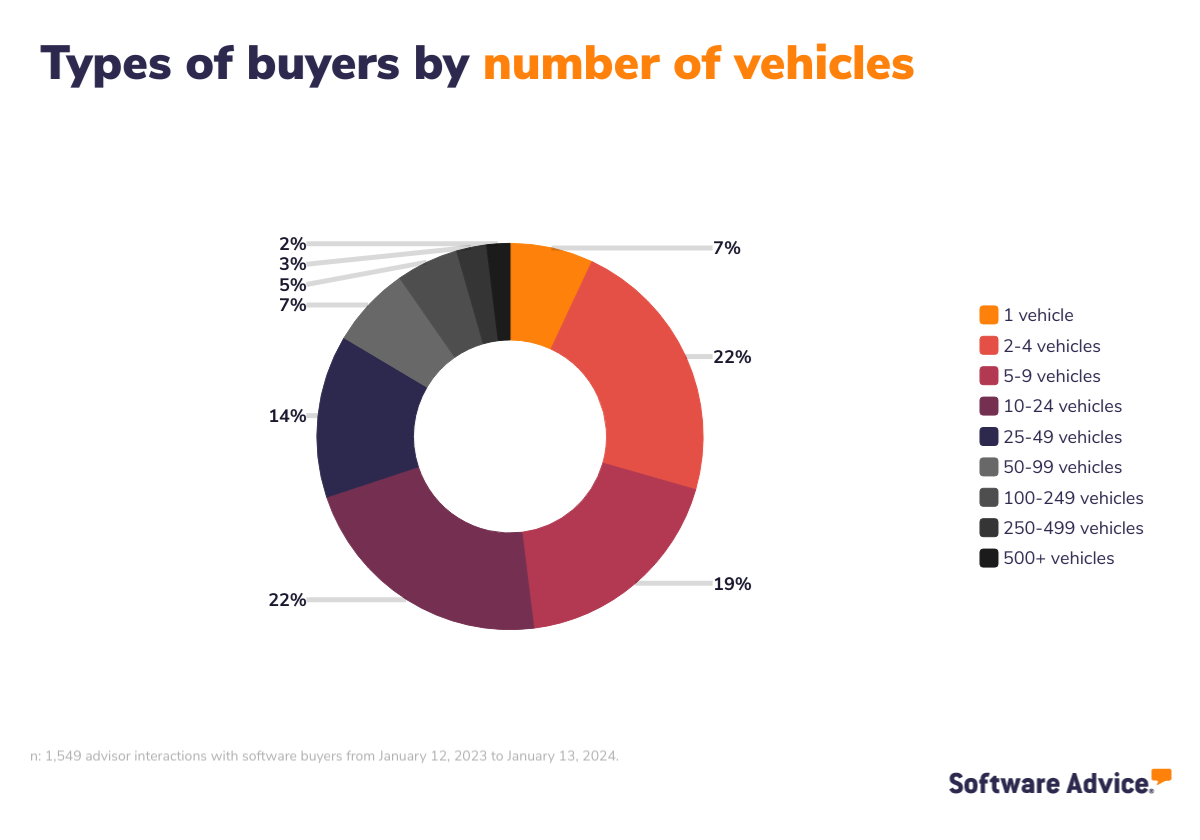
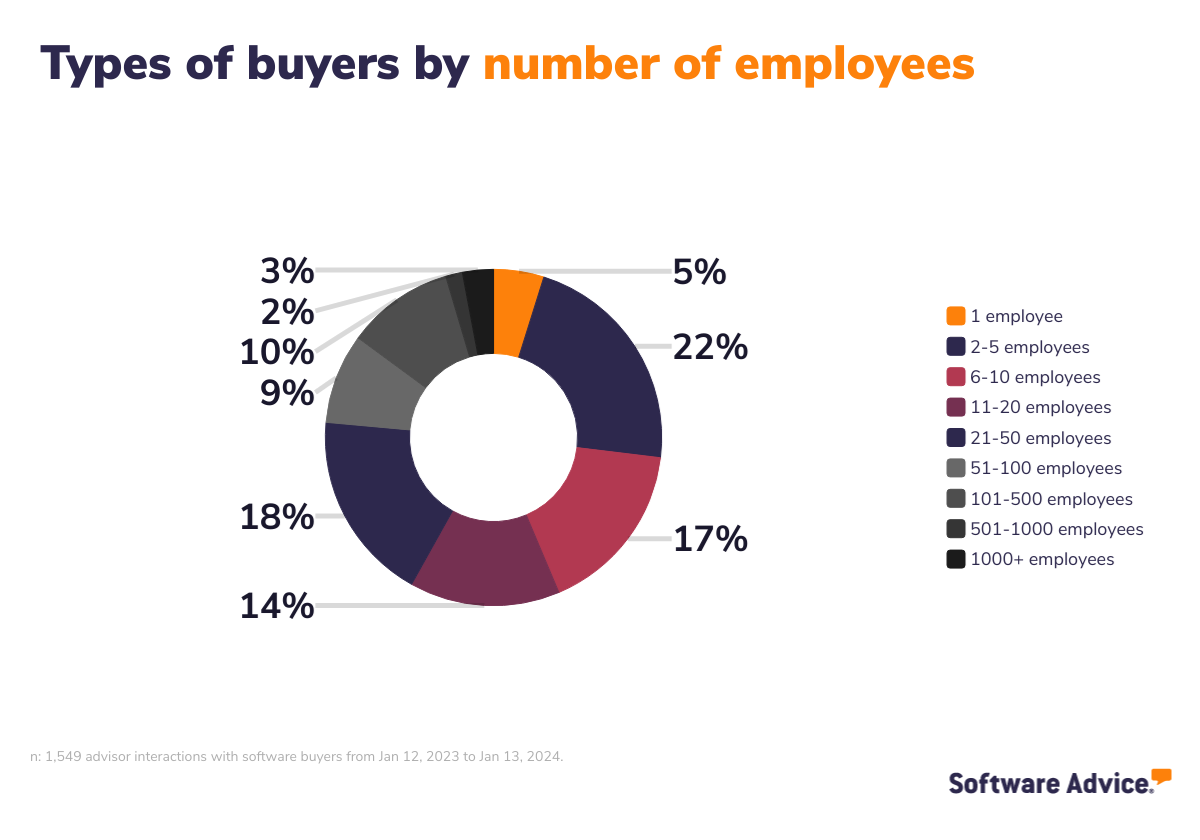
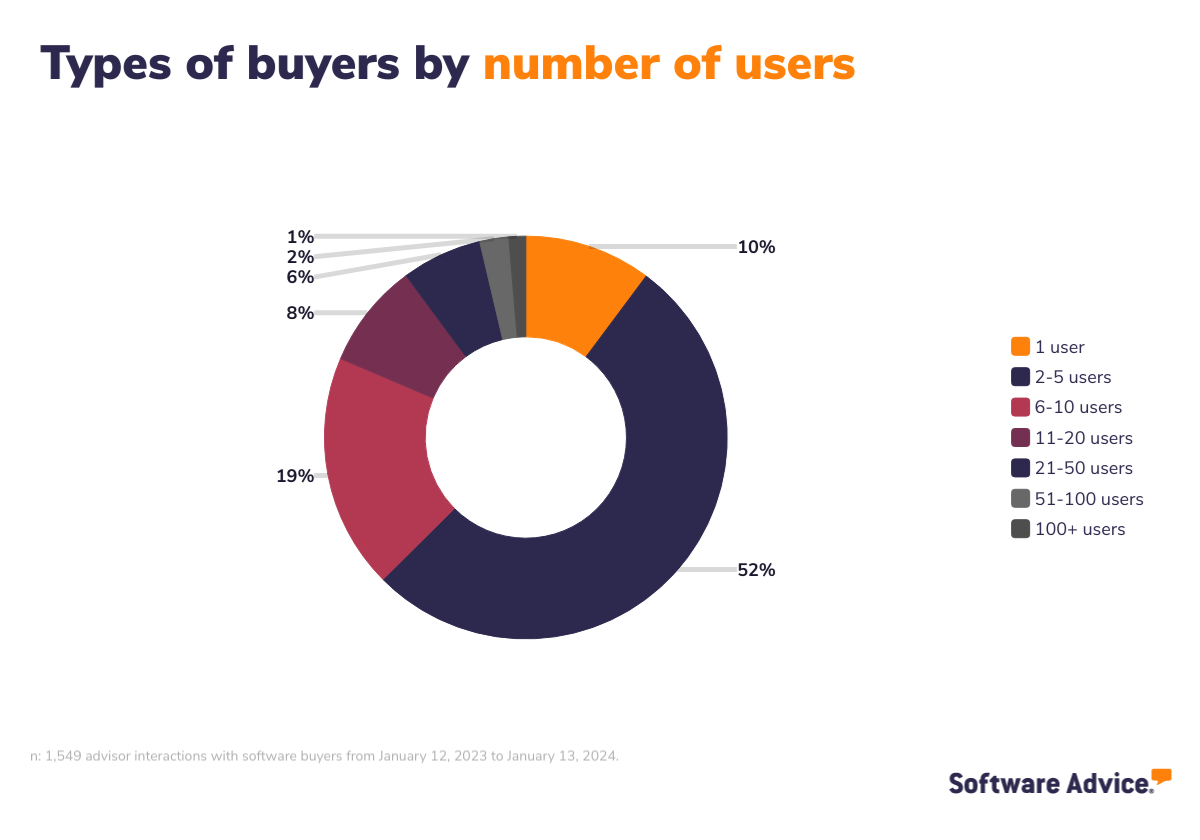
Methodology
Software buyers analysis methodology
Findings are based on data from conversations that Software Advice’s advisor team has daily with software buyers seeking guidance on purchase decisions. The data used to create this report is based on interactions with small-to-midsize businesses seeking fleet management tools. For this report, we analyzed approximately 1,500+ phone interactions from January 12, 2023, to January 13, 2024.
The findings of this report represent buyers who contacted Software Advice and may not be indicative of the market as a whole. Data points are rounded to the nearest whole number.